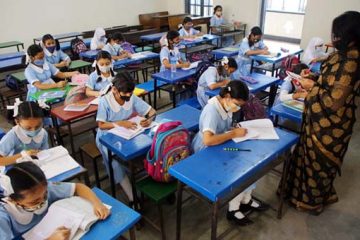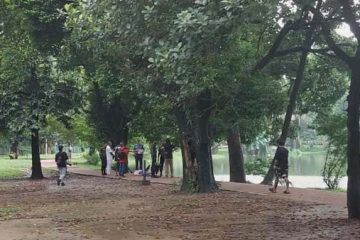An international crimes tribunal on Tuesday handed down death sentence to Bangladesh Nationalist Party lawmaker Salauddin Quader Chowdhury for committing genocide and killings in Chittagong during the country’s Liberation War in 1971.
The three-member International Crimes Tribunal-1 pronounced the unanimous judgment against Salauddin, now 64, in the crowded courtroom in the Old High Court building amid tight security.
‘…he be hanged by the neck till he is dead,’ the presiding judge, Justice ATM Fazle Kabir, pronounced the verdict at about 1:15pm.
The tribunal pronounced the verdict amid controversies over the alleged leak of the judgment with Salauddin, his family and defence counsels claiming that the copy available online and the judgment were the same.
Salauddin faced 23 charges in the war crimes trial. The tribunal found him guilty of nine charges and not guilty of the rest 14 charges.
Salauddin was awarded death sentence on four of the nine charges – two for committing genocide and deportation in Sultanpur Banikpara and Unasattarpara on April 13, 1971, one for killing industrialist and philanthropist Natun Chandra Singha at Maddhaya Gohira on the same day and the other for abducting Chittagong Awami League founder Sheikh Mozaffar Ahmed and his son Sheikh Alamgir on April 17, 1971 and later killing them.
‘The accused is convicted and sentenced to death for each charge mentioned above under section 20(2) of the said act for committing the gravest offences, and accordingly he be hanged by the neck till he is dead,’ Justice Fazle Kabir pronounced the verdict.
On April 4, 2012, Salauddin was indicted on 23 charges of crimes against humanity committed in Chittagong during the Liberation War.
A smiling Salauddin in panjabi and pajama was produced before the tribunal.
But he turned pensive and at times looked restless sitting on a chair in the dock while the tribunal was delivering the judgment.
As the tribunal completed delivering the verdict, he sprang to his feet and said, ‘The verdict is an order from the ministry and now available online.’ He thanked the law ministry.
The tribunal judges, meanwhile, left the courtroom.
Family members of Salauddin were present in the courtroom to hear the verdict.
The law enforcers then took him to the ground floor of the tribunal building.
Hundreds of people, freedom fighters, political and cultural activists, who gathered outside the tribunal, burst out in cheers and welcome slogans instantly as the news of the verdict reached them.
Besides the presiding judge, two other tribunal members – Justice Jahangir Hossain and Justice Anwarul Haque – also read out parts of the judgment.
Salauddin was awarded 20 years in prison on each of the three charges – two for committing genocide at Madhya Gohira Hindu Para and Jagatmallapara on April 13, 1971 and the other for arson attack at Satish Chandra Palit’s house in Raujan pourasabha area, killing Satish and causing deportation of his family on the following day.
The tribunal awarded Salauddin 5 years’ imprisonment on each of two charges – one for abducting Nizamuddin Ahmed, Shiraj and Wahid alias Junu Pagla from Hajari Lane under Kotwali police station in Chittagong on July 5, 1971 and torturing them in confinement and the other for abducting Md Salahuddin from village Mohra in the third week of July, 1971 and torturing him in confinement. All of them were tortured in confinement in Salauddin’s parental home in Goods Hill in Chittagong.
‘However, all the aforesaid sentences awarded to the accused will naturally get merged into a single sentence of death as and when executed upon him,’ the tribunal chairman said.
It said that the convict was at liberty to prefer appeal to the Appellate Division of the Supreme Court against the order of conviction and sentence within 30 days from the date of passage of the order of sentence.
Of the 14 charges Salauddin was acquitted of, no prosecution witness testified to prove six charges – genocide at Kodurkhil in mid-April, 1971, genocide, loot and rape in Ghashi Majhirpara on May 10, 1971, abduction of Sheikh Maimun Ali Chowdhury from Chandanpur in mid-May, 1971 and torture on him, abduction of Omar Faruk on June 7, 1971, and torturing and killing him, abducting Binajuri union parishad chairman Fazlul Haque on August, 1971 and torturing him in confinement and abduction of Nuru Chowdhury from Sadarghat in the second week of August, 1971 and torturing him in confinement.
Salauddin was acquitted of the eight other charges, including committing genocide after abduction of seven Hindus in April, 1971 and killing them at Goods Hill, genocide at village Shakpura on April 20, 1971, genocide at Jagatmallapara on May 5, 1971, looting a jeep and a rice mill at village Dabua on April 13, 1971, abducting Md Hanif of Patherhat on May 20, 1971, and torturing and killing him in confinement, abducting two people from Liakat Ali road under Hathajari on July 27, 1971 and killing one of them, abducting Akhlas Mia from village Kodurkhil on July 27 or 28, 1971 and killing him and abducting M Salimullah on September 2, 1971 and torturing him in confinement at Goods Hill.
This was the seventh war crimes case verdict in the independent Bangladesh and the third verdict of the ICT-1 since its establishment on March 25, 2010.
The ICT-2 has so far delivered verdicts in four war crimes cases since its establishment on March 22, 2012.
A large number of freedom fighters, lawyers from both the defence and the prosecution, intellectuals, cultural activists and journalists were present in the courtroom.
Emerging from the tribunal after the verdict, the prosecution chief coordinator MK Rahman, along with other members of the team, said he was happy with the verdict.
Salauddin’s defence lawyer AKM Fakhrul Islam showed the journalists a copy of the ‘leaked’ judgment and said it was the law ministry’s judgment.
‘This is miscarriage of justice. We will go to the Appellate Division and would seek retrial of the case,’ the defence lawyer said.
Echoing him, Salauddin’s son Fayyaz Quader Chowdhury said they were denied justice and that they would appeal against the verdict.
On August 14, on completion of hearing both the sides, ICT-1 reserved its judgment in Salauddin’s war crimes case for pronouncement on a later date.
Justice ATM Fazle Kabir, before delivering the verdict, said the full judgment was of 172 pages and the tribunal would read out a summary judgment.
Salauddin was handed the punishment for offences punishable under Section 20(2) of the International Crimes (Tribunals) Act of 1973. Section 20(2) of the law stipulates, ‘Upon conviction of an accused person, the tribunal shall award sentence of death or such other punishment proportionate to the gravity of the crime as appears to the tribunal to be just and proper.’
Earlier, the two tribunals delivered verdicts in six war crimes cases and all the convicts were present or former leaders of Jamaat-e-Islami.
Former Jamaat chief Ghulam Azam was sentenced to 90 years in jail.
Death sentences were handed to four others, including Delwar Hossain Sayedee, Ali Ahsan Mohammad Mojaheed, Mohammad Kamaruzzaman and absconding former Jamaat member Abul Kalam Azad alias Bachchu Razakar. Jamaat leader Abdul Quader Molla was awarded life term imprisonment by a tribunal but the Appellate Division allowed a defence plea seeking Quader’s death sentence.
The cases of BNP leader Abdul Alim and alleged Al-Badr commanders – Md Ashrafuzzaman Khan and Chowdhury Mueenuddin are waiting for judgment.
The trials of six others on war crimes charges are in progress. The accused include Jamaat leaders Matiur Rahman Nizami, AKM Yusuf, Mir Quasem Ali and expelled Awami League leader Mobarak Hossain.
Jamaat leaders Abdus Subhan, ATM Azharul Islam and absconding Nagarkanda BNP leader Zahid Hossain Khokon await indictment on war crimes charges.
The war crimes investigation agency has completed the probe against former Jatiya Party state minister Syed Md Qaisar and found his involvement in crimes against humanity in 1971.
‘This Tribunal (ICT-1) has been lawfully constituted as a domestic judicial forum for the purpose of holding trials relating to internationally recognised crimes, such as, crimes against humanity, genocide and other offences committed during the War of Liberation in 1971,’ tribunal member Justice Anwarul Haque began to read out the Salauddin judgement at around 10:45am.
Salauddin was born on 13 March, 1949.
He and his father Fazlul Quader Chowdhury, the then president of Convention Muslim League, joined hands with the Pakistan-army and its auxiliary forces to commit crimes against humanity and genocide in Chittagong during the War of Liberation in 1971, the judgement’s ‘brief account of the accused’ part said.
It said that Salauddin had actively participated in the large-scale killing of unarmed Hindu people in Chittagong and also committed offences of abduction, torture, looting, deportation, genocide and all other atrocities during the War of Liberation of Bangladesh in collaboration with the Pakistan army, Razakars, Al-Badrs and Al-Shams.
For his anti-liberation role, freedom fighters attacked Salauddin Quader Chowdhury and threw grenade at him on September 20, 1971. He left the country afterwards and came back to Bangladesh in 1974.
The judgment said that Salauddin and his father had used their ‘Goods Hill’ residence in Chittagong as a torture camp and he as a self-declared brigadier used to conduct operations under his leadership in different places of Chittagong during the Liberation War.
‘.. we are of the view that the “tripartite agreement” is not at all a barrier to prosecuting civilian perpetrators under the act [of 1973],’ the tribunal observed on the ‘Tripartite agreement between Bangladesh, India and Pakistan in 1974 and immunity to 195 Pakistani war criminals.
The prosecution produced 41 witnesses to prove the charges against Salauddin.
Four defence witnesses, including Salauddin himself, testified pleading his innocence and saying that the accused had left the country on March 29, 1971 and returned in April 1974, in other words as he was not present at the crime spots during the Liberation War it was not possible for him to commit the crimes.
The tribunal, in its judgment, found that, besides the prosecution witnesses and documents, four books that Salauddin had submitted to the tribunal in support of his innocence showed that Salauddin’s claim that he was absent from the crime scenes was false.
‘The demeanour of accused Salauddin Quader Chowdhury’ chapter of the judgement said, ‘The accused is a sitting lawmaker of the country but his attitude towards judiciary is found to be disrespectful’ and ‘the accused is an elected people’s representative but his art of deliberation, actions and conduct as shown in the courtroom was not in conformity with decency and convention of good behaviour.’
The accused filed a series of applications one after another to delay the proceeding of the case but those applications were disposed of in accordance with law, the tribunal said.
The prosecution laid the formal charges against Salauddin on November 14, 2011 and the ICT-1 took them into cognisance on November 17, 2011.
Salauddin was shown arrested in the war crimes case and produced before the tribunal on November 02, 2010.
Salauddin was a minister in Ershad’s government in the 1980s. He was also a Jatiya Party leader and was elected to parliament on its tickets.
Salauddin quit Jatiya Party in the second half of the 1980s.
He founded his own party National Democratic Party and elected a lawmaker of his party.
In 1996, Salauddin and his NDP took part in the Awami League-led movement against the then BNP government that saw the introduction of non-party caretaker government for holding parliamentary polls.
Later, he joined BNP and was elected to parliament on its ticket.
-With New Age input




















